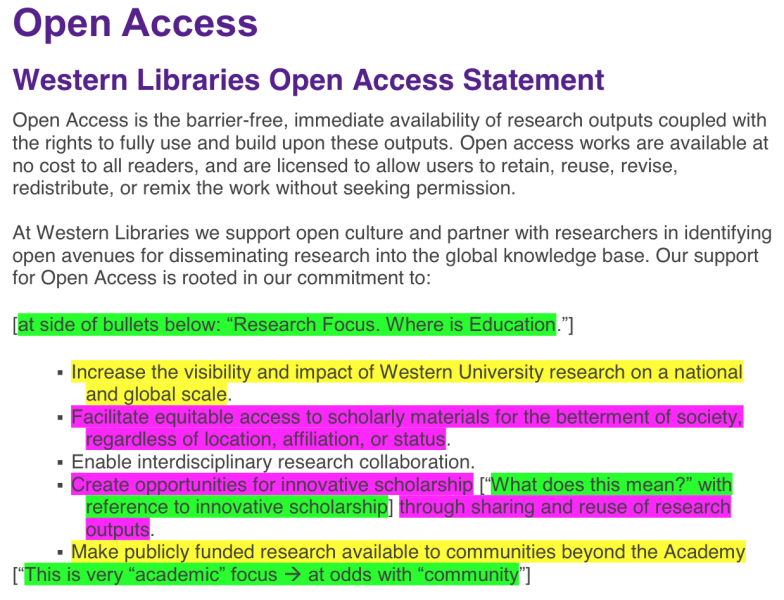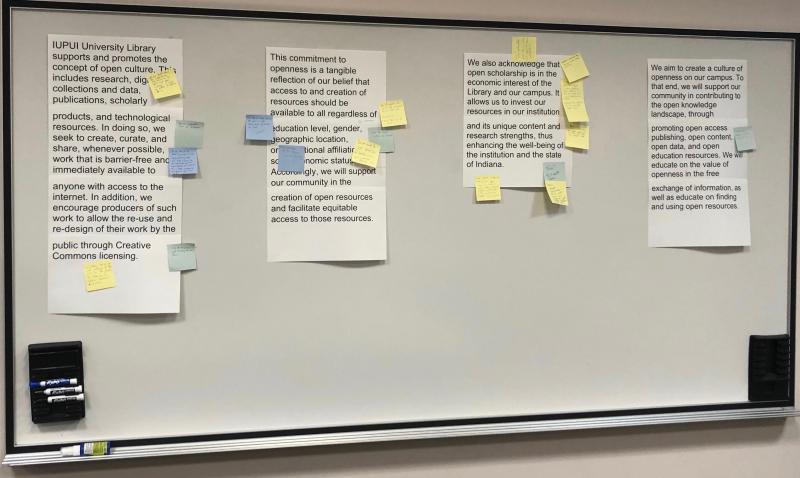IUPUI University Library has long been committed to advancing Open, and has engaged in a variety of projects and services in support of that commitment. Recently, our Scholarly Communication Librarian suggested we develop an advisory group that would assess current and future investments in Open modeled after the University of California’s STAR Team. Library administration agreed the library should make its goals and commitments to Open public and moved to appoint and charge such a group. At the same time, Herbert Simon Family Dean Kristi Palmer and I attended the Choosing Pathways to Open Access Forum hosted by the University of California, Berkeley. We came to the conclusion, based on our participation there, that we, as a Library, needed to pause and reflect on what it is we value about Open. By creating an Open Values Statement, we would create a guidepost for assessing the ways in which we invest in the advancement of Open.
We chose to base the development of our Statement on a process described by the University of Western Ontario Libraries in their In the Library with the Lead Pipe article. For us, this meant creating mechanisms for gathering input and feedback from the entire Library that our new Scholarly Communication Advisory Group would review and use to create the Statement. We modified Western Libraries’ initial questions to staff to reflect our desire for our Statement to more broadly address our Open values beyond what is typically thought of as Open Access. Our input process began during our January 2019 organizational development days by gathering responses to those modified questions. Responses were grouped by themes and discussed in an Open Values town hall session.
- What does Open mean to you?
- Why does (or should) UL support Open?
- How does (or could) UL support Open?

Our next phase was to conduct two internal focus groups where we reviewed the themes of the town hall and then asked participating employees to review two example Open Access Statements from other university libraries and to annotate the statements with indicators of support, caution, and confusion regarding specific words and phrases. Participants discussed their annotations with the group. The themes, annotations, and discussion notes were compiled and reviewed by the Scholarly Communication Advisory Group to inform a first draft.

Pairs of Group members wrote the first draft in three sections, which corresponded to our opening three questions. As the Group leader, I compiled those sections into a cohesive draft that the Group (repeatedly) reviewed and approved as ready for a second stage of feedback.
Our second round of Library-wide feedback occurred during our May organizational development days. During this session, two Group members provided an overview of the process to date and asked attendees to document their support, caution, and confusion about specific words and phrases in the draft Statement. Attendees then engaged in a group discussion of their caution and confusion notes. Following the session, I compiled the results of the session into a single annotated version of the Statement. The Scholarly Communication Advisory Group reviewed and integrated the feedback over the course of two meetings to finalize the Library’s Open Values Statement.

Many thanks to the members of the Scholarly Communication Advisory Group for their efforts!
- Tina Baich, Senior Associate Dean for Scholarly Communication & Content Strategies
- Heather Coates, Co-Director, Center for Digital Scholarship & Data Management Librarian
- Chip Dye, Director of Operations
- Justin Kani, OER & Business/SPEA Librarian
- Mairelys Lemus-Rojas, Digital Initiatives Metadata Librarian
- Jere Odell, Scholarly Communication Librarian
- Caitlin Pike, Research Engagement Coordinator & Health Sciences Librarian
- Denise Rayman, Philanthropic Studies Librarian & Digital Archivist
Now that the Open Values Statement is complete, the Group can move to developing mechanisms for evaluating Open investment opportunities through the lens of our values. We also believe it is important to demonstrate our Open values by sharing our work. So please, read our Open Values Statement and stay tuned for future products from University Library’s Scholarly Communication Advisory Group.
